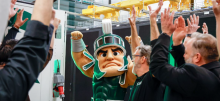
MSU’s Supercomputer Celebrates 20 Years of Accelerating Research
The Institute for Cyber-Enabled Research (ICER) marked its 20th anniversary this February with a celebration at the MSU Union Ballroom, highlighting two decades of advancing high-performance computing (HPC) on campus. Event highlights included a poster session showcased impactful research enabled by MSU’s supercomputer.
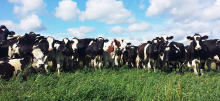
KBS Pasture Dairy Center Wraps Up 15 Years of Innovation
Starting in 2009, the Pasture Dairy Center at the W.K. Kellogg Biological Station pioneered automatic robotic milking combined with data-driven intensive rotational grazing methods for dairy cattle. These robots remained operational for 15 years and were instrumental in informing the rapid adoption of robotic milking systems across Michigan.

Spartan Researchers Make Every Drop Count
College of Natural Science Assistant Professor Anthony Kendall and College of Engineering Associate Professor Annick Anctil are part of an interdisciplinary team. Together, with Kansas Geological Survey and Kansas State University, they created a system to increase groundwater and preserve aquifers by harnessing the power of solar panel arrays.
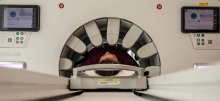
MSU Researchers Fight Cancer for You
From understanding the origins of cancer to engineering precision therapies, MSU scientists continue to push the boundaries of what’s possible in the fight against this disease.
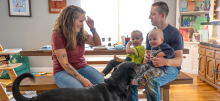
Research for You
With support from the federal government, Spartan researchers have delivered lifesaving breakthroughs for generations and continue to tackle our most urgent challenges. From lifesaving cancer drugs that treat millions to advancements in agriculture that help deliver healthy food to the kitchen table, Spartan research makes life better.
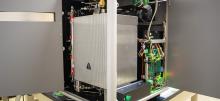
Moran’s Research to Better Understand Earth’s Ecosystems
Moran’s research uses stable isotope analysis to address an array of questions linked to microbial ecology and plant-microbe interactions. He is particularly interested in tracking interactions between plant roots and microbes in the thin region of soil just outside the roots, called the rhizosphere.
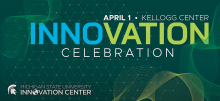
MSU Salutes Breakthroughs in Innovation and Entrepreneurship at 2025 Innovation Celebration
Michigan State University’s Innovation Center hosted the highly anticipated 2025 Innovation Celebration on April 1 at the Kellogg Center, honoring the trailblazers advancing research, entrepreneurship, and economic development in the region and beyond.
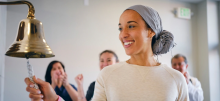
American Cancer Society Grant Fuels Research in Colorectal, Breast and Cervical Cancer
Four dedicated researchers from Michigan State University have received grants totaling more than $3 million from the American Cancer Society, or ACS, to find new ways to prevent, detect, treat and help patients survive colorectal, breast and cervical cancer.
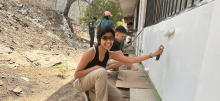
Student View: Research, Resilience and Giving Back at MSU
Veona Cutinho is a senior majoring in genomics and molecular genetics with a minor in mathematics at Michigan State University. She works in the Cellular Reprogramming Lab under Dr. Jose Cibelliand is the founder and editor-in-chief of SPARC, MSU’s first undergraduate-led academic journal.

School-Based Asthma Therapy Improves Student Health, Lowers Medical Costs
School-based asthma therapy, or SBAT, is a way to help students breathe easier. Students say that they like learning to be responsible for taking their medication, they can run around outside, and they feel better when they take their medicine regularly.
